中考英语必备-易混淆知识点总结
中考英语常用易混淆单词词组的区别用法详解
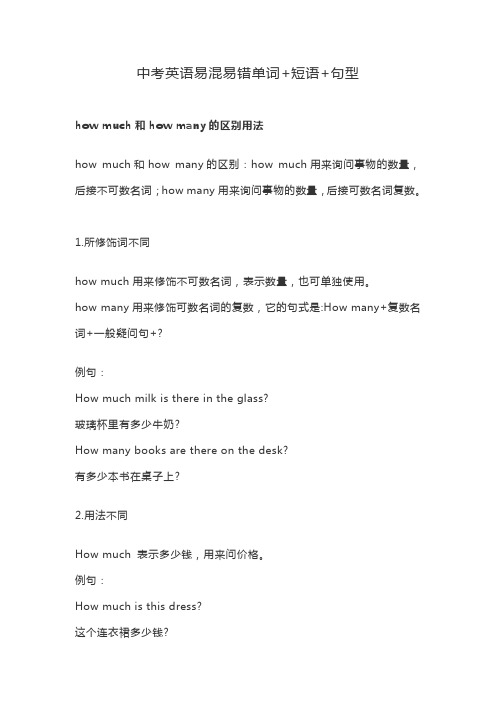
中考英语易混易错单词+短语+句型how much和how many的区别用法how much和how many的区别:how much用来询问事物的数量,后接不可数名词;how many用来询问事物的数量,后接可数名词复数。
1.所修饰词不同how much用来修饰不可数名词,表示数量,也可单独使用。
how many用来修饰可数名词的复数,它的句式是:How many+复数名词+一般疑问句+?例句:How much milk is there in the glass?玻璃杯里有多少牛奶?How many books are there on the desk?有多少本书在桌子上?2.用法不同How much 表示多少钱,用来问价格。
例句:How much is this dress?这个连衣裙多少钱?How many 表示多少,用来问数量。
例句:How many apples do you have?你有多少苹果?in和on的区别用法当我们表示某些东西被其他东西所包围时使用“in”这个词。
而“on”用于描述物体被放置在其他物体上方或外部的情况。
in可表时间,表地点,表手段、方法、材料。
on表示时间、地点、方位等。
1.意思不同in:prep.在... 里;在... 地方;在... 期间on:prep.在... 之上2.用法不同in:in着重一段时间的过程,常用于重复动作或延续动作。
in表示从现在时间算起推移到将来的一段时间之后,一般与将来时态连用。
例句:He is a layman in economics.他对经济学一窍不通。
on:表示“在物体的表面上”,只能用on的表达方式有on the next morning,on the following。
例句:The spider is walking on the ceiling.蜘蛛在天花板上爬行。
3.侧重点不同in:表示“在其中”。
on:表示“在表面”。
中考语法重点梳理总结
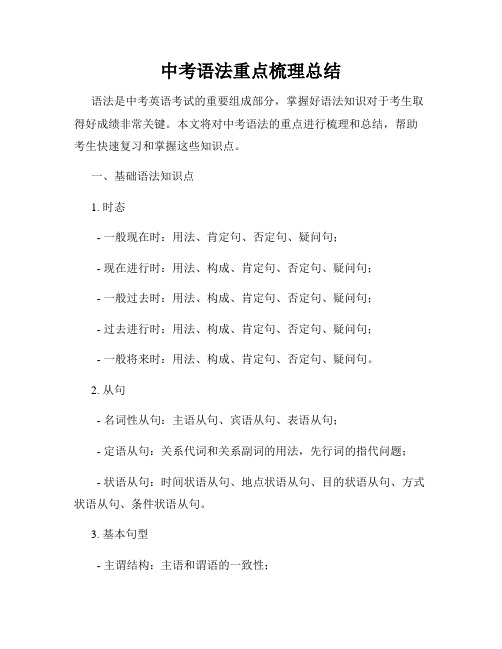
中考语法重点梳理总结语法是中考英语考试的重要组成部分,掌握好语法知识对于考生取得好成绩非常关键。
本文将对中考语法的重点进行梳理和总结,帮助考生快速复习和掌握这些知识点。
一、基础语法知识点1. 时态- 一般现在时:用法、肯定句、否定句、疑问句;- 现在进行时:用法、构成、肯定句、否定句、疑问句;- 一般过去时:用法、构成、肯定句、否定句、疑问句;- 过去进行时:用法、构成、肯定句、否定句、疑问句;- 一般将来时:用法、构成、肯定句、否定句、疑问句。
2. 从句- 名词性从句:主语从句、宾语从句、表语从句;- 定语从句:关系代词和关系副词的用法,先行词的指代问题;- 状语从句:时间状语从句、地点状语从句、目的状语从句、方式状语从句、条件状语从句。
3. 基本句型- 主谓结构:主语和谓语的一致性;- 主谓宾结构:动宾搭配、及物动词和不及物动词; - 主系表结构:系动词的用法、表语的形式。
二、常见错误类型及纠正方法1. 词性错误- 形容词和副词的用法区别;- 名词和动词的转化。
2. 时态错误- 部分考生容易混淆不同时态的用法;- 注意句子的上下文语境,选择正确的时态。
3. 代词错误- 指代不明确,造成语义模糊;- 注意先行词和代词在语法和逻辑上的一致性。
4. 介词错误- 介词搭配的固定搭配用法;- 注意特殊动词和介词的搭配。
三、复合句的连接词1. 并列连接词- and, but, or, so等的用法和区别;- 注意使用上的逻辑连贯和前后句之间的平衡。
2. 引导性连接词- because, if, when, while等的用法;- 注意从句与主句之间的逻辑关系。
3. 状语连接词- before, after, since等的用法;- 理解并正确运用时间、地点和条件等状语从句。
四、易混淆的语法知识点1. 动词时态和语态的区别;2. 定语从句和状语从句的区别;3. 直接引语和间接引语的句式转换。
五、巩固方法与技巧1. 多做语法练习题,掌握各类语法知识的运用;2. 利用语法书籍和教辅材料进行针对性的学习;3. 多听、多读、多写,培养语感和理解能力。
2024中考备考英语重难点01 易混名词辨析(解析版)
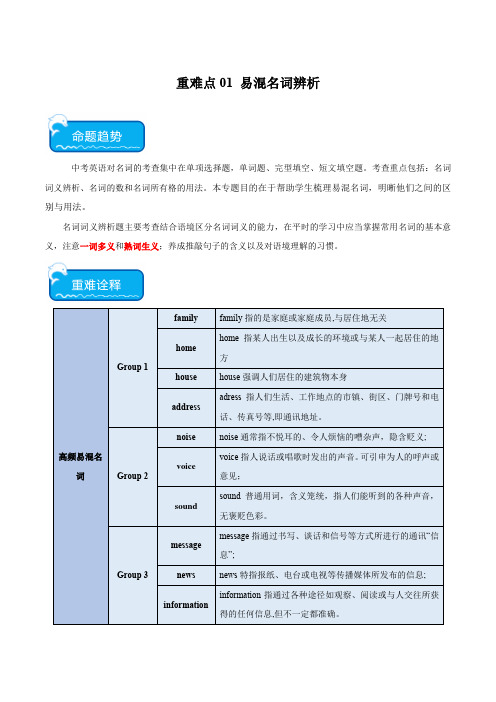
重难点01 易混名词辨析中考英语对名词的考查集中在单项选择题,单词题、完型填空、短文填空题。
考查重点包括:名词词义辨析、名词的数和名词所有格的用法。
本专题目的在于帮助学生梳理易混名词,明晰他们之间的区别与用法。
名词词义辨析题主要考查结合语境区分名词词义的能力,在平时的学习中应当掌握常用名词的基本意义,注意一词多义和熟词生义;养成推敲句子的含义以及对语境理解的习惯。
(2023中考真题建议用时:15分钟)1.(2023·辽宁鞍山·中考真题)—Why does Mary get good grades each time?—I think that’s because she puts most of her ________ into her schoolwork.A.energy B.practice C.exercise D.process2.(2023·内蒙古·中考真题)—The model plane is wonderful! How did you make it?—It’s easy. Follow the ________ and you can do it, too.A.discussion B.education C.conditions D.instructions3.(2023·江苏淮安·中考真题)As a student, you should keep a ________ between your schoolwork and yourhobbies.A.diary B.record C.secret D.balance4.(2023·湖北襄阳·中考真题)—Mr. Fan runs at least half an hour every day.—What a good ________! No wonder he looks healthy.A.habit B.question C.article D.prediction5.(2023·湖北黄石·中考真题)—Could you tell me the ________ of making such tasty dumplings?—Well, I just follow the steps on Tiktok.A.cost B.method C.time D.menu6.(2023·内蒙古呼和浩特·中考真题)High-speed trains are seen as one of the new Four Great ________ of China.A.Inventions B.Advantages C.Environments D.Technologies7.(2023·江苏常州·中考真题)After she was brought back to China, the sick giant panda Ya Ya received good ________ in her new home and got better.A.education B.communication C.entertainment D.treatment8.(2023·江苏南通·中考真题)—________ are easily made, but not easily kept.—That’s true. Once you make one, be sure to keep it.A.Speeches B.Decisions C.Promises D.Suggestions9.(2023·江苏镇江·中考真题)The main ________ of the cities along the Grand Canal (大运河) is history and culture.A.attraction B.pollution C.invention D.situation10.(2023·青海·中考真题)A taxi driver prevented (阻止) an _________ when he saw a car with serious problems travelling across Huangnan.A.accident B.interview C.advertisement11.(2023·山东青岛·中考真题)Before flying a plane, a ________ must take a lot of training.A.policeman B.musician C.nurse D.pilot12.(2023·湖北十堰·中考真题)—How did you fix up the machine, dad?—It’s easy. I just followed the ________.A.instructions B.inventions C.interviews D.influences13.(2023·江苏徐州·中考真题)Of all the ________, I love summer best.A.seasons B.subjects C.colours D.hobbies14.(2023·辽宁丹东·中考真题)Mary’s parents are interested in ________, so they often take her to concerts.A.sports B.music C.science D.movies15.(2023·江苏宿迁·中考真题)—The girl’s beautiful pronunciation caught our ________ in yesterday’s English speech competition.—Yes, many students couldn’t help cheering for her.A.condition B.attention C.invention D.position16.(2023·江苏泰州·中考真题)—Good news! The Chinese women table tennis team won a gold and a silver again.—Great! No matter who wins the medals, it is the ________ of our country.A.price B.pioneer C.pride D.pain17.(2023·黑龙江牡丹江·中考真题)Although our school life is a little busy, it is full of ________.A.pain B.sadness C.laughter18.(2023·四川遂宁·中考真题)—Which movie would you like to watch, Tracy?— Um…it’s hard to make a ________.A.survey B.choice C.call D.wish19.(2023·辽宁·中考真题)Thanks to the teacher’s help, I solved all the ________ easily.A.chances B.problems C.habits D.grades20.(2023·辽宁营口·中考真题)Scientists who are full of ________ always come up with new ideas and bring great changes to our life.A.instruction B.instrument C.invention D.introduction1.A【详解】句意:——为什么玛丽每次都取得好成绩?——我想那是因为她把大部分精力都放在功课上了。
中考英语最易混淆词汇汇总

中考英语最易混淆词汇汇总1. clothes, cloth, clothingclothes统指各种衣服,谓语动词永远是复数, cloth指布,为不可数名词clothing 服装的总称,指一件衣服用a piece of, an article of2. incident, accidentincident指小事件, accident指不幸的事故He was killed in the accident.3. amount, numberamount后接不可数名词, number后接可数名词 a number of students4. family, house, homehome 家,包括住处和家人,house房子,住宅,family家庭成员. My family is a happy one.5. sound, voice, noisesound自然界各种各样的声音,voice人的嗓音,noise噪音I hate the loud noise sutside.6. photo, picture, drawingphoto用照相机拍摄的照片,picture可指相片,图片,电影片,drawing画的画Let's go and see a goodpicture.7. vocabulary, wordvocabulary词汇,一个人拥有的单词量,word具体的单词He has a large vocabulary.8. population, peoplepopulation人口,人数,people具体的人 China has a large population.9. weather, climateweather一天内具体的天气状况,climate长期的气候状况The climate here is not good for you.10. road, street, path, wayroad具体的公路,马路,street街道,path小路,小径, way道路,途径take this road; in the street, show me the way to the museum.11. course, subjectcourse课程(可包括多门科目),subject科目(具体的学科)a summer course12. custom, habitcustom传统风俗,习俗,也可指生活习惯,后接to do, habit生活习惯,习惯成自然,后接of doing. I've got the habit ofdrinking a lot.13. cause, reasoncause 指造成某一事实或现象的直接原因,后接ofsth./doing sth,reason用来解释某种现象或结果的理由,后接for sth./doing sth. the reason for being late14. exercise, exercises, practiceexercise运动,锻炼(不可数),exercises练习(可数), practice(反复做的)练习 Practice makesperfect.15. class, lesson作"课"解时,两者可以替换.指课文用lesson. 指班级或全体学生用class. lesson 6; class 516. speech, talk, lecturespeech指在公共场所所做的经过准备的较正式的演说,talk日常生活中的一般的谈话,讲话,lecture学术性的演讲, 讲课 a series of lecture on…17. officer, officialofficer部队的军官,official政府官员 an armyofficer18. work, job二者均指工作。
初中基础单词容易混淆的词汇
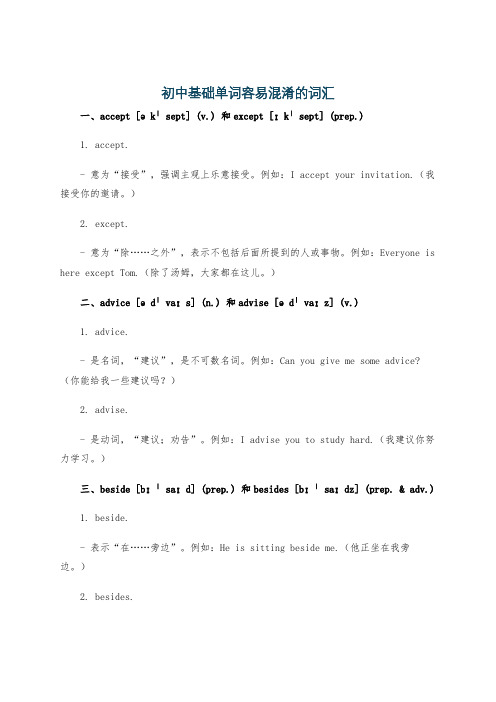
初中基础单词容易混淆的词汇一、accept [əkˈsept] (v.) 和except [ɪkˈsept] (prep.)1. accept.- 意为“接受”,强调主观上乐意接受。
例如:I accept your invitation.(我接受你的邀请。
)2. except.- 意为“除……之外”,表示不包括后面所提到的人或事物。
例如:Everyone is here except Tom.(除了汤姆,大家都在这儿。
)二、advice [ədˈvaɪs] (n.) 和advise [ədˈvaɪz] (v.)1. advice.- 是名词,“建议”,是不可数名词。
例如:Can you give me some advice?(你能给我一些建议吗?)2. advise.- 是动词,“建议;劝告”。
例如:I advise you to study hard.(我建议你努力学习。
)三、beside [bɪˈsaɪd] (prep.) 和besides [bɪˈsaɪdz] (prep. & adv.)1. beside.- 表示“在……旁边”。
例如:He is sitting beside me.(他正坐在我旁边。
)2. besides.- 作介词时,意为“除……之外(还有)”;作副词时,意为“而且;此外”。
例如:Besides English, we also learn French.(除了英语,我们还学法语。
);I don't like this dress. Besides, it's too expensive.(我不喜欢这条裙子。
而且,它太贵了。
)四、borrow [ˈbɒrəʊ] (v.) 和lend [lend] (v.)1. borrow.- 意为“借入”,常用搭配borrow sth. from sb.。
例如:I borrow a book from the library.(我从图书馆借了一本书。
中考英语重点易混淆短语总结精华(推荐)
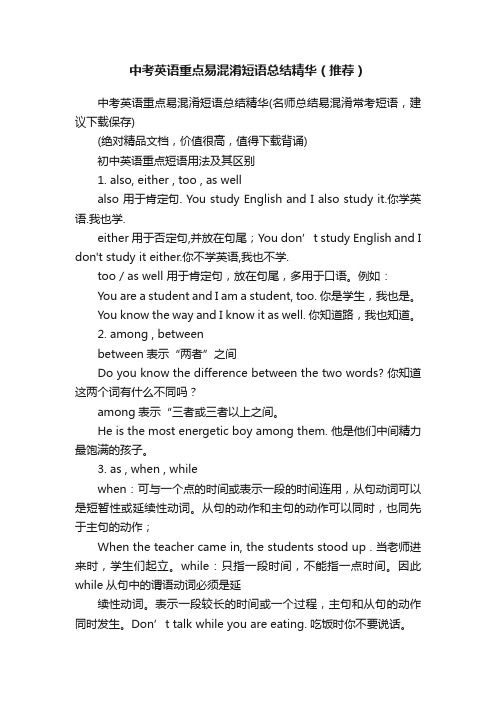
中考英语重点易混淆短语总结精华(推荐)中考英语重点易混淆短语总结精华(名师总结易混淆常考短语,建议下载保存)(绝对精品文档,价值很高,值得下载背诵)初中英语重点短语用法及其区别1. also, either , too , as wellalso 用于肯定句. You study English and I also study it.你学英语.我也学.either 用于否定句,并放在句尾;You don’t study English and I don't study it either.你不学英语,我也不学.too / as well 用于肯定句,放在句尾,多用于口语。
例如:You are a student and I am a student, too. 你是学生,我也是。
You know the way and I know it as well. 你知道路,我也知道。
2. among , betweenbetween表示“两者”之间Do you know the difference between the two words? 你知道这两个词有什么不同吗?among表示“三者或三者以上之间。
He is the most energetic boy among them. 他是他们中间精力最饱满的孩子。
3. as , when , whilewhen:可与一个点的时间或表示一段的时间连用,从句动词可以是短暂性或延续性动词。
从句的动作和主句的动作可以同时,也同先于主句的动作;When the teacher came in, the students stood up . 当老师进来时,学生们起立。
while:只指一段时间,不能指一点时间。
因此while从句中的谓语动词必须是延续性动词。
表示一段较长的时间或一个过程,主句和从句的动作同时发生。
Don’t talk while you are eating. 吃饭时你不要说话。
中考英语词汇部分专题讲解:中考英语易混词汇辨析

中考英语易混词汇辨析及练习above/over/on词汇用法例句above “在……上方”,不一定含有垂直在上的意思。
反义词为:belowThe sun rose above the horizon.太阳升到了地平线以上。
over“在……上面”,含有垂直在上的意思There is a bridge over the river.河上有座桥。
on“在……上面”,含有与表面相接触的意思There is an oil painting on the wall.墙上有一幅油画。
across/through词汇用法例句across “横过,穿过”,指从……的一边到另一边Be careful when you walk across the road.当你过马路的时候要小心。
through“穿过”,强调从内部穿过The river flows through the city from west to east.这条河从西到东流过城市。
at all/after all词汇用法例句at all “全然,根本不”,一般用于否定句中加强语气She doesn’t like football at all.她一点也不喜欢足球。
after all “毕竟,终究,到底”,一般置于句首或句末作状语After all,he is a child.毕竟,他还是个孩子。
few/a few/little/a little词汇含义修饰名词肯定/否定例句few 几乎没有可数否定I am a new comer here,so I have few friends here.我刚来到这里,所以我在这里没有几个朋友。
a few有一些肯定Though the man has been here for only one month, he has a few friends.尽管这个人才在这里住了一个月,但他就有了一些朋友。
little 几乎没有不可数否定There is little water in the glass,so you can’t drinkany.杯子里几乎没有水了,你不可能喝到水了。
初中英语中考常用介词短语和易混易错词组
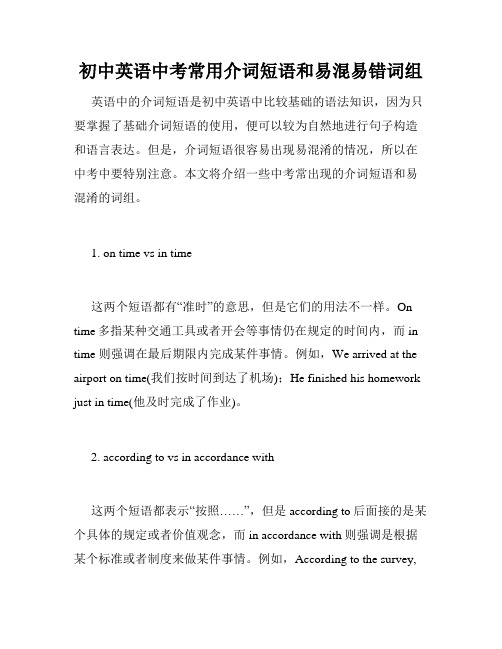
初中英语中考常用介词短语和易混易错词组英语中的介词短语是初中英语中比较基础的语法知识,因为只要掌握了基础介词短语的使用,便可以较为自然地进行句子构造和语言表达。
但是,介词短语很容易出现易混淆的情况,所以在中考中要特别注意。
本文将介绍一些中考常出现的介词短语和易混淆的词组。
1. on time vs in time这两个短语都有“准时”的意思,但是它们的用法不一样。
On time多指某种交通工具或者开会等事情仍在规定的时间内,而in time 则强调在最后期限内完成某件事情。
例如,We arrived at the airport on time(我们按时间到达了机场);He finished his homework just in time(他及时完成了作业)。
2. according to vs in accordance with这两个短语都表示“按照……”,但是according to后面接的是某个具体的规定或者价值观念,而in accordance with则强调是根据某个标准或者制度来做某件事情。
例如,According to the survey,more and more people prefer to work from home(根据调查,越来越多的人喜欢在家工作); In accordance with company regulations, smokers may only smoke in designated areas(根据公司规定,吸烟者只能在指定区域吸烟)。
3. in spite of vs despite这两个短语都表示“尽管”,但in spite of通常用来表示困难或者阻力,而despite则强调不受阻碍的情况。
例如,In spite of the heavy rain, we still went hiking(尽管下着大雨,我们还是去远足了);Despite the fact that he was tired, he continued to work(尽管很累,他还是继续工作)。
中考英语78个易混易错单词、短语、句型
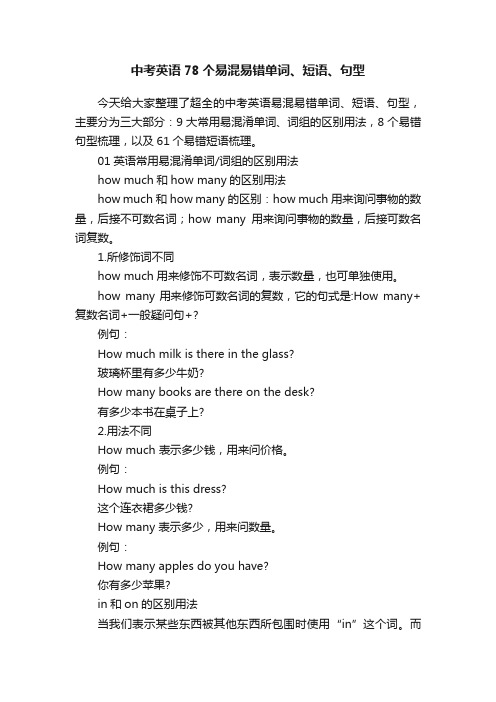
中考英语78个易混易错单词、短语、句型今天给大家整理了超全的中考英语易混易错单词、短语、句型,主要分为三大部分:9大常用易混淆单词、词组的区别用法,8个易错句型梳理,以及61个易错短语梳理。
01英语常用易混淆单词/词组的区别用法how much和how many的区别用法how much和how many的区别:how much用来询问事物的数量,后接不可数名词;how many用来询问事物的数量,后接可数名词复数。
1.所修饰词不同how much用来修饰不可数名词,表示数量,也可单独使用。
how many用来修饰可数名词的复数,它的句式是:How many+复数名词+一般疑问句+?例句:How much milk is there in the glass?玻璃杯里有多少牛奶?How many books are there on the desk?有多少本书在桌子上?2.用法不同How much 表示多少钱,用来问价格。
例句:How much is this dress?这个连衣裙多少钱?How many 表示多少,用来问数量。
例句:How many apples do you have?你有多少苹果?in和on的区别用法当我们表示某些东西被其他东西所包围时使用“in”这个词。
而“on”用于描述物体被放置在其他物体上方或外部的情况。
in可表时间,表地点,表手段、方法、材料。
on表示时间、地点、方位等。
1.意思不同in:prep.在 ... 里;在 ... 地方;在 ... 期间on:prep.在 ... 之上2.用法不同in:in着重一段时间的过程,常用于重复动作或延续动作。
in表示从现在时间算起推移到将来的一段时间之后,一般与将来时态连用。
例句:He is a layman in economics.他对经济学一窍不通。
on:表示“在物体的表面上”,只能用on的表达方式有on the next morning,on the following。
中考易混淆单词
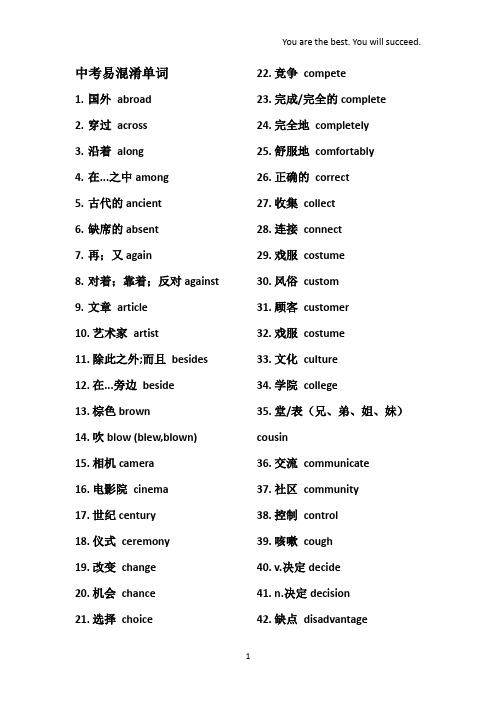
You are the best. You will succeed.中考易混淆单词1.国外abroad2.穿过across3.沿着along4.在...之中among5.古代的ancient6.缺席的absent7.再;又again8.对着;靠着;反对against9.文章article10.艺术家artist11.除此之外;而且besides12.在...旁边beside13.棕色brown14.吹blow (blew,blown)15.相机camera16.电影院cinema17.世纪century18.仪式ceremony19.改变change20.机会chance21.选择choice 22.竞争compete23.完成/完全的complete24.完全地completely25.舒服地comfortably26.正确的correct27.收集collect28.连接connect29.戏服costume30.风俗custom31.顾客customer32.戏服costume33.文化culture34.学院college35.堂/表(兄、弟、姐、妹)cousin36.交流communicate37.社区community38.控制control39.咳嗽cough40.v.决定decide41.n.决定decision42.缺点disadvantageYou are the best. You will succeed.43.挖dig(dug, dug)44.邀请invite45.发明invent46.邀请invitation47.发明invention48.分开divide49.电electricity50.电的electric51.电子的elcetronic52.实验experiment53.经验;经历experience54.尤其;特别especially55.确切地exactly56.极好的;优秀的excellent57.除了except58.期望expect59.表达express60.表现behave61.表扬perform62.渔夫fisherman63.第四fourth64.十四fourteen 65.第四十fortieth66.法语/法国人的French67.法国France68.外国人foreigner69.花园garden70.地理geography71.毕业graduate72.逐渐地gradually73.大体的general74.客人guest75.门卫;士兵guard76.导游guide77.德语/德国人的German78.德国Germany79.习惯habit80.爱好hobby81.幽默的humorous82.高度height83.重量weight84.加热heat85.心脏heart86.拥抱hug(hugged,hugged)87.隐藏hide(hid,hidden)88.放;下(蛋)lay( laid, laid)89.躺lie (lay, lain)90.撒谎(lied,lied)91.邀请invite92.发明invent93.产业;工业industry94.面试;采访interview95.介绍introduction96.指示;指令instruction97.立刻immediately98.日语/日本人的Japanese99.模型model100.中间的middle101.嘴巴mouth102.月month103.老鼠mouse104.钱money105.猴子monkey106.奖牌medal107.铁的metal108.精神上的mental 109.医学的medical110.药medicine111.机器machine112.材料material113.第九ninth114.九十ninety115.(两者)都不neither 116.(三者以上)都不none 117.第九十ninetieth 118.乘客passenger119.段落/走廊passage 120.合适地properly121.可能地possibly122.可能地probably123.承诺promise124.产品product125.英镑pound126.骄傲的proud127.骄傲n. pride128.小学生pupil129.紫色purple130.价格price131.奖品prize132.表扬;赞扬praise 133.星球planet134.种植/植物plant 135.荣幸;快乐pleasure 136.完美的perfect 137.耐心的patient 138.有礼貌的polite 139.飞行员pilot140.准备prepare 141.更喜欢prefer 142.预防prevent 143.保护protect144.污染pollute145.生产v. produce 146.过程n.process 147.十分quite148.安静的quiet 149.收到receive150.意识到realize 151.提醒remind152.复习,回顾review 153.害怕的(形容人)scared 154.害怕的(形容物)scary 155.酸的sour156.咸的salty157.糖sugar158.卖;销售n.sale159.卖;销售V.sell160.v.服务serve161.n.服务service162.n.仆人servant163.围巾scarf164.分离separate165.小吃,零食snack 166.蛇snake167.标准standard168.严格的strict169.严肃的,认真的serious 170.象征symbol171.标志sign172.社会society173.社会的social174.偷steal(stole, stolen)175.摇晃shake(shook,shaken) 176.传播spread177.速度speed178.猜想;设想suppose 179.支持support180.建议suggest181.成功v.succeed182.成功n.success183.通过through184.虽然though/although 185.扔throw (threw, thrown) 186.周二Tuesday187.周四Thursday188.十三thirteen189.三十thirty190.十二twelve191.第十二twelfth192.朝;向toward(s)=to 193.向前forward194.厕所toilet195.珍宝treasure196.雨伞umbrella 197.大学university 198.参观者visitor 199.视频;录像video 200.周三Wednesday 201.天气weather 202.是否whether。
(完整版)初中常见易混淆英语词汇

1.sound, voice, noisesound自然界各种各样的声音,voice人的嗓音,noise噪音I hate the loud noise outside.2. exercise, exercises, practiceexercise运动,锻炼(不可数),exercises练习(可数),practice(反复做的)练习take exercise 做运动3. work, job二者均指工作。
work不可数,job可数a good job,What interesting work it is!4. cook, cookercook厨师,cooker厨具He is a good cook.5. police, policemanpolice警察的总称,后接复数谓语动词,policeman 指某个具体的警察The police are questioning everyone in the house.6. problem, questionproblem常和困难联系,前面的动词常为think about, solve, raise,question常和疑问联系,多和ask, answer连用7. price, prizeprice价格,prize奖,奖品,奖金win the first prize The price is high/low.8. a number of, the number ofa number of许多,谓语动词用复数。
the number of…的数目,谓语动词用单数。
The number of students is increasing.9. in front of, in the front ofin front of范围外的前面,in the front of范围内的前面A boy sits in the front of the room.10. next year, the next yearnext year将来时间状语,the next year过去将来时间状语He said he would go abroad the next year.11. in bed, on the bedin bed卧在床上,on the bed在床上The book is on the bed. He is ill in bed.12. the people, a peoplethe people指人,a people指民族The Chinese is a peace-loving people.13. it, oneit同一物体,one同类不同一I lost my pen. I have to buy a new one.14. that, thisthat指代上文所提到的,this导出下文所要说的I was ill. That's why…15. none, nothing, no onenone强调有多少,nothing, no one强调有没有,nothing指物,no one指人--- How many…/How much…? --- None.16. anyone, any oneanyone指人,不能接of,any one指人/物均可,可接of, any one of you17. who, whatwho指姓名或关系,what指职业或地位What is your dad? He is a teacher.18. what, whichwhat的选择基础是无限制的,which在一定范围内进行选择Which do you prefer, bananas or apples?19. other, anotherother后接名词复数,another后接名词单数other students, another student20. many, much, a lot ofmany和可数名词连用,much和不可数名词连用,a lot of可数,不可数均可,但不用于否定句I haven't many books.21. much more…than, many more…thanmuch more…than后接形容词或不可数名词,many more…than后接可数名词many more people, much more water, much more beautiful22. no, notno=not a/any, no friend=not a/any friend, no water=not any water23. by oneself, for oneself, to oneselfby oneself单独的,独自的,for oneself为自己,to oneself供自己用的24. at all, after allat all根本,全然, after all到底,毕竟After all he is a child.25. tall, hightall常指人或动物,high常指物体He is tall.26. fast, quicklyfast侧重于指人或物体具有运动速度快的特点,quickly侧重指某事完成或发生的快run fast, answer the question quickly27. high, highlyhigh具体的高,highly抽象的高,高度的think highly of(高度赞扬)28. sleeping, asleep, sleepysleeping正在睡觉,asleep睡着,熟睡,只能做表语,sleepy困的,有睡意的a sleeping baby,The baby is asleep. I'm sleepy.29. real, truereal真的,真实的,指的是事实上存在而不是想象的,true真的,真正的,指的是事实和实际情况相符合real gold, a true story30. pleasant, pleased, pleasingpleasant常用作定语,pleased常用作表语,pleased主语常为人,a pleasant trip,be pleased with…对…感到满意/开心31. ill, sickill做表语,sick定语、表语均可a sick boy, He is sick/ill.32. good, wellgood形容词,well副词,但指身体状况是形容词He is well again.33. hard, hardlyhard努力,hardly几乎不work hard, I can hardly believe it.34. excited, excitingexcited使人兴奋的,exciting令人兴奋的I'm excited. The news is exciting.35. before long, long beforebefore long不久以后,long before很久以前36. happy, gladhappy高兴,幸福,定表均可,glad高兴,只能做表语a happy girl, I’m happy/ glad to see you.37. instead, instead ofinstead是副词,放在句首或句末,instead of是介词短语,放在句中He didn't see a film. Instead he watched TV. He watched TV instead of seeing a film.38. too much, much tootoo much 后接不可数名词,much too后接形容词much too heavy39. raise, riseraise及物动词,rise不及物动词The sun rises in the east. Raise your hand, please.40. bring, take, carry, fetchbring拿来,take带走,carry随身携带,fetch去回这一往返动作fetch a box of chalk41. spend, take, pay, costspend人做主语,花钱,花时间; s pend…on sth./(in) doing sth; take物做主语,花时间; It takes sb some time to do sth.; pay人做主语,花钱,pay for; cost物做主语,花钱;sth cost some money42. join, join in, take part injoin加入某个组织,并成为其中的一员;join in参加小型的活动, join sb. in;take part in 参加大型的活动He joined the army five years ago.43. learn, studylearn学习,侧重学习的结果,study学习,侧重学习的过程,研究study the problem44. want, hope, wishwant打算,想要,want to do, want sb. to do, hope希望(通常可以实现),hope to do/ hope that… wish希望(通常不能实现)wish (sb.) to do, wish sb/sth. + n. I wish you success.45. answer, replyanswer及物动词,reply不及物动词,后接to, reply to the letter46. leave, leave forleave离开,leave for前往He left Beijing for Shanghai.47. drop, falldrop及物\不及物均可,fall不及物动词Prices fell/dropped. He dropped his voice.48. win, lose, beatwin后接sth.,反义词为lose, beat后接sb. win the game, beat them49. live on, live bylive on以…为主食,live by靠…谋生live on fish/ live by fishing50. catch a cold, have a coldcatch a cold不能和表示"一段时间"的状语连用,而have a cold可以She has had a cold for a week.51. change for, change intochange for调换成,change into变成Change the shirt for a bigger one. Water changes into ice.52. go for a doctor, go to a doctorgo for a doctor去请医生,go to a doctor去看病53. arrive, get, reacharrive不及物动词,后接in (大地点),at(小地点),get不及物动词后接to,reach及物动词arrive in Beijing, get to Beijing, reach Beijing54. agree with, agree to,agree with同意某人,agree to同意某事,agree with you, agree to the plan, agree to do sth55. receive, acceptreceive收到某一东西,但不一定接受,accept接受I received a gift, but I didn't accept it.56. wear, put on, dresswear和dress表状态,wear接衣服等,可用进行时,dress接人,be dressed in, put on表动作It's cold outside. Put on your warm clothes.57. listen, hearlisten强调动作,hear强调结果I listened, but I heard nothing.58. look, see, watchlook看的动作,see看的结果,watch强调所看物体的变化、移动和发展watch TV59. lie, laylie躺,位于(lay, lain),说谎(lied, lied),lay平放(laid, laid) lay the book60. turn, get, growturn表突变,后常接表颜色的词,get强调变的结果,grow强调过程,逐渐的变化turn yellow, get tired, grow big61. close, shut, turn offclose和shut当关解时可以通用,用于可开合的物体,turn off用于指有开关的物体Close/Shut the door. Turn off the TV.62. at, in (表地点)at小地点,in大地点arrive at a small village, arrive in Shanghai63. day after day, day by dayday after day日复一日(无变化);day by day一天天地(有变化)Trees grow taller day by day.64. after, in (表时间)after接时间点,in接时间段,用于将来时after 7:00, in five minutes65. between, amongbetween两者之间,三者或三者以上两两之间, among三者或三者以上之间Switzerland lies between France, Germany, Australia and Italy.66. through, acrossthrough穿越空间,across在…上穿过through the forest, across the desert67. above, on, overabove在上面,不接触,on在上面,接触,over在正上方fly over the hill68. until, not…untiluntil到…为止,not…until直到…才(常跟点动词连用)I waited until 3:00.He didn't come until 3:00.69. besides, exceptbesides除了…还(包括在内)except除了(不包括在内),70. because, because ofbecause连词,连接两句话,because of后接词或短语He didn't go to school because of his illness.71. for example, such asfor example一般只列举一个,such as列举多个例子I have been to a lot of American cities, such as New York, Atlanta and Chicago.72. All right. That's all right. That's right.All right好吧;That's all right.没关系;That's right. 那是对的---Sorry. --- That's all right.73. such…that, so…that当如此…以至于解时,such…that修饰名词,so…that修饰形容词或副词,但名词前面如果有many, much, little, few修饰用so…that,不用such thatso many people that… such a lovely boy=so lovely a boy74. Shall I…? Will you…?Shall I…? 征求对方意见或向对方请示,意为我能…吗? Will you…?请求或建议对方做某事,意为你愿意…吗? Will you help me? Yes, I will.。
2023年中考英语语法易错高频考点汇总
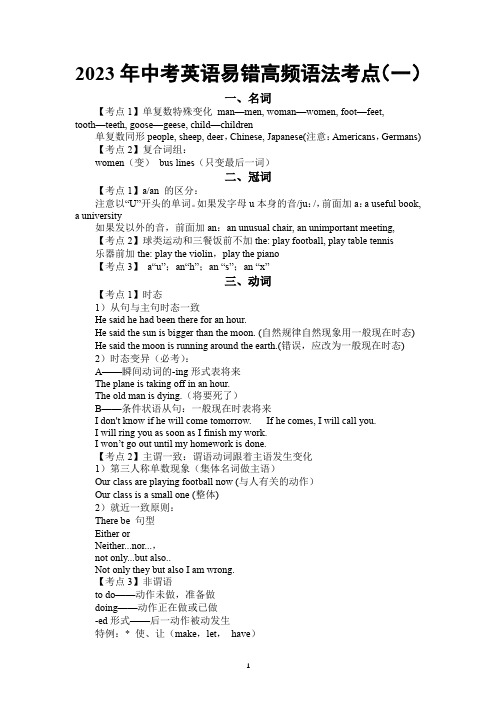
2023年中考英语易错高频语法考点(一)一、名词【考点1】单复数特殊变化man—men, woman—women, foot—feet, tooth—teeth, goose—geese, child—children单复数同形people, sheep, deer,Chinese, Japanese(注意:Americans,Germans)【考点2】复合词组:women(变)bus lines(只变最后一词)二、冠词【考点1】a/an 的区分:注意以“U”开头的单词。
如果发字母u本身的音/ju:/,前面加a:a useful book, a university如果发以外的音,前面加an:an unusual chair, an unimportant meeting,【考点2】球类运动和三餐饭前不加the: play football, play table tennis乐器前加the: play the violin,play the piano【考点3】a“u”;an“h”;an “s”;an “x”三、动词【考点1】时态1)从句与主句时态一致He said he had been there for an hour.He said the sun is bigger than the moon. (自然规律自然现象用一般现在时态)He said the moon is running around the earth.(错误,应改为一般现在时态)2)时态变异(必考):A——瞬间动词的-ing形式表将来The plane is taking off in an hour.The old man is dying.(将要死了)B——条件状语从句:一般现在时表将来I don't know if he will come tomorrow. If he comes, I will call you.I will ring you as soon as I finish my work.I won’t go out until my homework is done.【考点2】主谓一致:谓语动词跟着主语发生变化1)第三人称单数现象(集体名词做主语)Our class are playing football now (与人有关的动作)Our class is a small one (整体)2)就近一致原则:There be 句型Either orNeither...nor...,not only...but also..Not only they but also I am wrong.【考点3】非谓语to do——动作未做,准备做doing——动作正在做或已做-ed形式——后一动作被动发生特例:* 使、让(make,let,have)主动不带to,被动带tomake sb. do /make sb not do/be made to dolet sb. do【出处:】* The teacher asked the students to stop talking and to listen to her.原创作品* I have my car repaired.(我请人修理了我的车。
中考常见易混淆英语单词

中考常见易混淆英语单词1.worth, worthy 与worthwhileworth价值,可贵之处,作形容词时与worthy和worthwhile都是“值得……”的意思,但用法不同,如:This book is worth reading./This book is worth 3 yuan?./It s wort hwhile to visit (visiting) thisplace./This place is worthy of a visit (visiting ).worth只作表语,它后面一般接动名词,也可接名词,但只限于钱数,不接不定式。
如果用不定式或动名词作主语,则要用It s worthwhile…结构,把不定式、动名词放在句末;worthy是形容词,worthy可作表语,也可作定语,作表语时,后跟of接名词或动名词,也可以接不定式。
worthwhile和worth虽均有“值得的”意思,worth只作表语,用于be worth sth.短语中,如:It s worth the trouble.麻烦一点值得。
This watch is worth this much money.这块手表值这么多钱;而worthwhile意为“值得一做的(worth doing)”,既可作表语,如:T hese results were not worthwhile.也可用作定语。
2.rise 与 raise这两个词虽不同义,但因意义上有联系而易被混淆。
rise 上升,上涨,起床,站立。
含义较广,总的意思是指依次上升,如自然界的日、月、星、雾、云的上升,人体从睡、跪、坐、躺等姿势站立起来等。
该词为不及物动词,其过去式与过去分词分别是rose 和 risen。
例如:The sun rises in the east and sets in the west.日出于东而落于西。
/ Prices rise every day in those countries.那些国家里的物价天天上涨。
中考英语之易混淆词汇知识点辨析
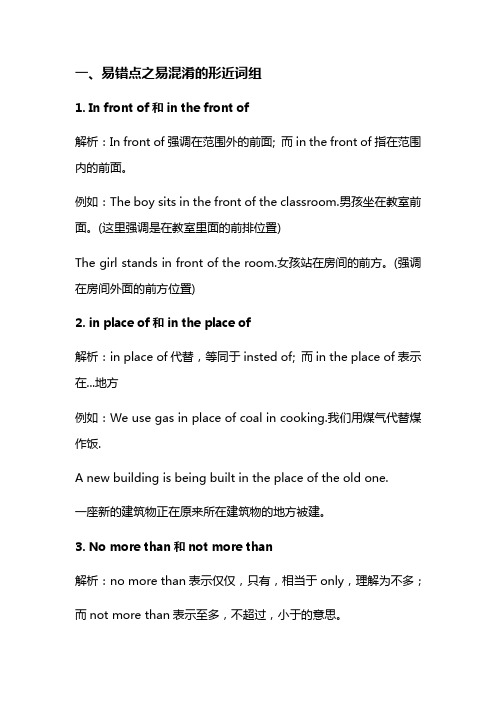
一、易错点之易混淆的形近词组1.In front of和in the front of解析:In front of强调在范围外的前面; 而in the front of指在范围内的前面。
例如:The boy sits in the front of the classroom.男孩坐在教室前面。
(这里强调是在教室里面的前排位置)The girl stands in front of the room.女孩站在房间的前方。
(强调在房间外面的前方位置)2.in place of和in the place of解析:in place of代替,等同于insted of; 而in the place of表示在...地方例如:We use gas in place of coal in cooking.我们用煤气代替煤作饭.A new building is being built in the place of the old one.一座新的建筑物正在原来所在建筑物的地方被建。
3.No more than和not more than解析:no more than表示仅仅,只有,相当于only,理解为不多;而not more than表示至多,不超过,小于的意思。
例如:He is no more than an ordinary English teacher. 他只不过是个普通的英文老师。
He has not more than three children. 他最多3 个孩子(有或许还不到三个)4.On earth和on the earth解析:两者都有在地上,在地球上的意思,但on earth还有到底,究竟的意思;On the earth只是单纯的表示在地上,在地球上例如:where on earth did you spring from?你究竟从哪里冒出来的?What if there was no lead on the earth at all?如果地球上根本就没有铅这种物质怎么办?5.At all和after all解析:at all表示根本,全然的意思,常用短语not at all表示一点也不;after all表示到底,毕竟的意思例如:I don't know him at all. 我根本不认识他。
中考英语常用易混淆单词词组的区别用法详解
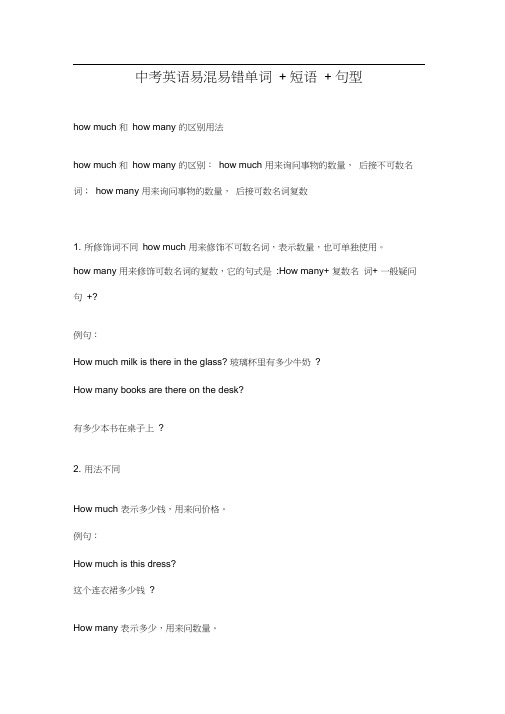
中考英语易混易错单词+ 短语+ 句型how much 和how many 的区别用法how much 和how many 的区别:how much 用来询问事物的数量,后接不可数名词;how many 用来询问事物的数量,后接可数名词复数1. 所修饰词不同how much 用来修饰不可数名词,表示数量,也可单独使用。
how many 用来修饰可数名词的复数,它的句式是:How many+ 复数名词+ 一般疑问句+?例句:How much milk is there in the glass? 玻璃杯里有多少牛奶?How many books are there on the desk?有多少本书在桌子上?2. 用法不同How much 表示多少钱,用来问价格。
例句:How much is this dress?这个连衣裙多少钱?How many 表示多少,用来问数量。
例句:How many apples do you have?你有多少苹果?in 和on 的区别用法当我们表示某些东西被其他东西所包围时使用“ in ”这个词。
而“ on 用于描述物体被放置在其他物体上方或外部的情况。
in 可表时间,表地点,表手段、方法、材料。
on 表示时间、地点、方位等。
1. 意思不同in :prep. 在... 里;在... 地方;在... 期间on :prep. 在... 之上2. 用法不同in :in 着重一段时间的过程,常用于重复动作或延续动作。
in 表示从现在时间算起推移到将来的一段时间之后,一般与将来时态连用。
例句:He is a layman in economics.他对经济学一窍不通on :表示“在物体的表面上”,只能用on 的表达方式有on the next morning ,on the following 。
例句:The spider is walking on the ceiling.蜘蛛在天花板上爬行。
中考易混淆单词词组汇总
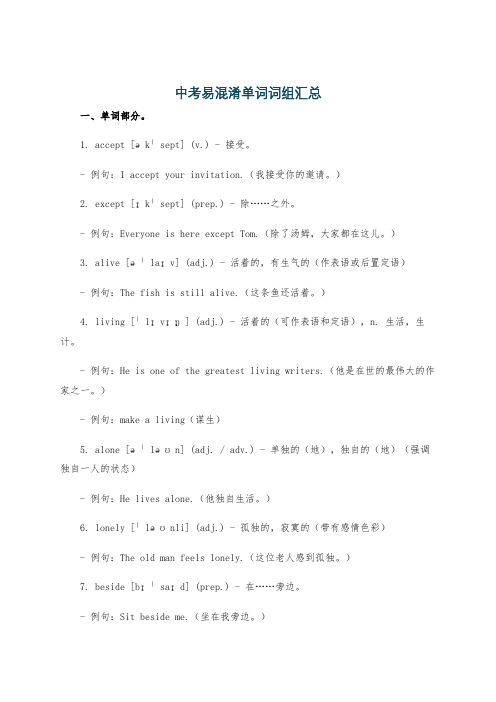
中考易混淆单词词组汇总一、单词部分。
1. accept [əkˈsept] (v.) - 接受。
- 例句:I accept your invitation.(我接受你的邀请。
)2. except [ɪkˈsept] (prep.) - 除……之外。
- 例句:Everyone is here except Tom.(除了汤姆,大家都在这儿。
)3. alive [əˈlaɪv] (adj.) - 活着的,有生气的(作表语或后置定语)- 例句:The fish is still alive.(这条鱼还活着。
)4. living [ˈlɪvɪŋ] (adj.) - 活着的(可作表语和定语),n. 生活,生计。
- 例句:He is one of the greatest living writers.(他是在世的最伟大的作家之一。
)- 例句:make a living(谋生)5. alone [əˈləʊn] (adj. / adv.) - 单独的(地),独自的(地)(强调独自一人的状态)- 例句:He lives alone.(他独自生活。
)6. lonely [ˈləʊnli] (adj.) - 孤独的,寂寞的(带有感情色彩)- 例句:The old man feels lonely.(这位老人感到孤独。
)7. beside [bɪˈsaɪd] (prep.) - 在……旁边。
- 例句:Sit beside me.(坐在我旁边。
)8. besides [bɪˈsaɪdz] (prep. / adv.) - 除……之外(还有),此外。
- 例句:Besides English, we also learn French.(除了英语,我们还学法语。
)- 例句:I don't like this dress. Besides, it's too expensive.(我不喜欢这条裙子。
它太贵了。
中考英语易混淆词汇总结
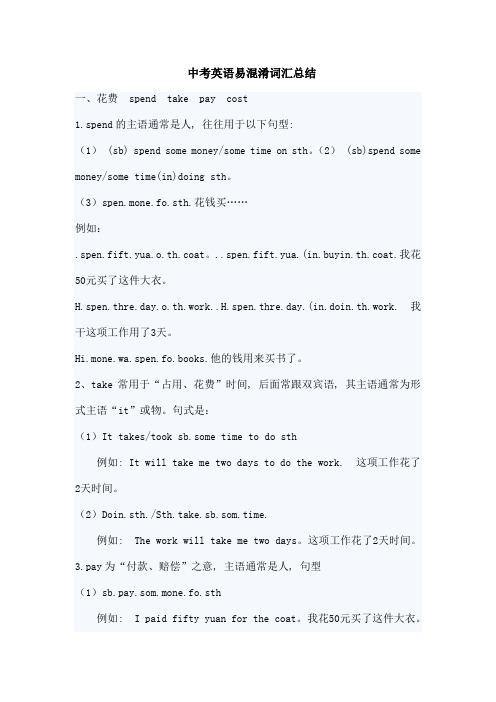
中考英语易混淆词汇总结一、花费 spend take pay cost1.spend的主语通常是人, 往往用于以下句型:(1) (sb) spend some money/some time on sth。
(2) (sb)spend some money/some time(in)doing sth。
(3)spen.mone.fo.sth.花钱买……例如:.spen.fift.yua.o.th.coat。
..spen.fift.yua.(in.buyin.th.coat.我花50元买了这件大衣。
H.spen.thre.day.o.th.work..H.spen.thre.day.(in.doin.th.work.我干这项工作用了3天。
Hi.mone.wa.spen.fo.books.他的钱用来买书了。
2、take常用于“占用、花费”时间, 后面常跟双宾语, 其主语通常为形式主语“it”或物。
句式是:(1)It takes/took sb.some time to do sth例如: It will take me two days to do the work. 这项工作花了2天时间。
(2)Doin.sth./Sth.take.sb.som.time.例如: The work will take me two days。
这项工作花了2天时间。
3.pay为“付款、赔偿”之意, 主语通常是人, 句型(1)sb.pay.som.mone.fo.sth例如: I paid fifty yuan for the coat。
我花50元买了这件大衣。
(2)pa.(sb..mone.fo.sth.付钱(给某人)买……。
例如:.hav.t.pa.the.2.pound.fo.thi.roo.eac.month.我每个月要付20英磅的房租。
(3)pay money back 还钱。
(4)例如: Ma..borro.1.yua.fro.yo.I'l.pa.i.bac.nex.week.你能借给我12块钱吗?下周还你。
初中英语总复习易混词盘点

初中英语总复习易混词盘点初中英语总复习易混词盘点从近年来的中考题可以看出命题者的目的都是要考查学生对一些较易混淆、形式上非常相近的词(词组)是否能掌握扎实,是否熟悉每个词组的中文意思并能在句子中熟练运用。
要想做对以上出现的类似的中考考题,考生必须能总结清各种初中阶段所学过的较易混淆、形式上非常相近的词(词组),熟记所有词组的中文意思,熟悉它们的用法和区别。
为了方便同学们复习,特将常考易混词(词组)整理如下:一、容易混淆的动词:[考试说明] 了解及物动词和不及物动词用法;掌握动词不定式作宾语、宾语补足语、状语以及疑问词连用构成不定式短语的基本用法;理解动词不定式作主语和定语的用法;初步掌握延续性动词和瞬间动词在用法上的区别等。
1. come & be here[误] He has come here for three hours.[正] He came here three hours ago.[正] He has been here for three hours.come是瞬间动词,不是延续性动词,在肯定句中不能与表示一段时间的状语连用。
而要与表示一段时间的状语连用,就要用延续动词。
与此同类的还有borrow/lend-keep; join-be in/at; die-be dead; buy-have; leave-be away,etc.2. cost & take & spend & pay[误] I cost a lot of time to read stories.[正] It cost me a lot of time to read stories.[正] I spent a lot of time reading stories.cost除了钱的花费以外,还能表示时间上的花费,但常用物做主语。
spend句子主语是人,可指花费时间和金钱,但后面的动词要用-ing形式,后面也可跟名词短语,介词用on。
英语中考易混淆单词与词组
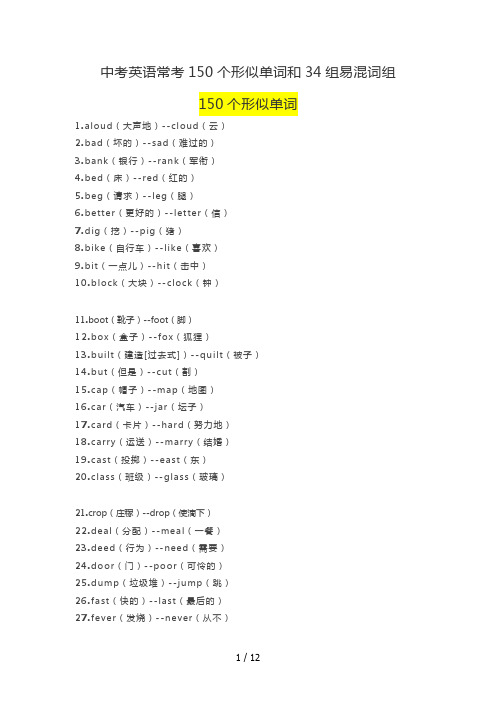
中考英语常考150个形似单词和34组易混词组150个形似单词1.aloud(大声地)--cloud(云)2.bad(坏的)--sad(难过的)3.bank(银行)--rank(军衔)4.bed(床)--red(红的)5.beg(请求)--leg(腿)6.better(更好的)--letter(信)7.dig(挖)--pig(猪)8.bike(自行车)--like(喜欢)9.bit(一点儿)--hit(击中)10.block(大块)--clock(钟)11.boot(靴子)--foot(脚)12.box(盒子)--fox(狐狸)13.built(建造[过去式])--quilt(被子)14.but(但是)--cut(割)15.cap(帽子)--map(地图)16.car(汽车)--jar(坛子)17.card(卡片)--hard(努力地)18.carry(运送)--marry(结婚)19.cast(投掷)--east(东)20.class(班级)--glass(玻璃)21.crop(庄稼)--drop(使滴下)22.deal(分配)--meal(一餐)23.deed(行为)--need(需要)24.door(门)--poor(可怜的)25.dump(垃圾堆)--jump(跳)26.fast(快的)--last(最后的)27.fever(发烧)--never(从不)28.fire(解雇)--hire(雇用)29.fish(鱼)--wish(希望)30.five(五)--live(生活)31.fix(安装)--mix(混和)32.fool(愚蠢的)--pool(小池)33.grade(年级)--trade(贸易)34.grain(谷物)--train(火车)35.hide(躲藏)--ride(骑)36.hot(热的)--not(不)37.house(房子)--mouse(老鼠)38.into(到……里面)--onto(到……上面)39.jeep(吉普车)--keep(保持)40.just(恰好)--must(必须)41.kick(踢)--pick(捡)42.kind(种类)--mind(介意)43.kiss(吻)--miss(错过)ter(后来)--water(水)45.lest(唯恐)--rest(休息)46.lid(盖子)--rid(去掉)47.life(生命)--wife(妻子)48.love(喜爱)--move(移动)49.mail(邮件)--rail(铁轨)50.meal(一餐)--real(真正的)51.mine(我的)--nine(九)52.moon(月亮)--soon(不久)53.most(最多的)--post(邮局)54.mouth(嘴)--south(南)55.much(许多)--such(这样的)56.next(下一个)--text(课文)57.north(北)--worth(值得……的)58.pork(猪肉)--work(工作)59.push(推)--rush(冲)60.reason(原因)--season(季节)61.ring(响)--wing(翅膀)62.sea(海洋)--tea(茶)63.sorry(难过的)--worry(使担忧)64.talk(谈话)--walk(散步)65.taste(品尝)--waste(浪费)66.bad(坏的)--bed(床)67.bat(球拍)--bit(一点儿)--but(但是)68.beg(请求)--big(大的)69.coal(煤)--cool(凉的)70.dead(死的)--deed(行为)71.dear(亲爱的)--deer(鹿)72.dig(挖)--dog(狗)--dug(dig 的过去和过去分词)73.fall 落下--fill 装满--full 满的74.fan(扇子)--fun(玩笑)75.farm(农场)--form(建立)76.fix(安装)--fox(狐狸)77.glass(玻璃)--grass(草地)78.hare 野兔--here 在这里--hire(雇用)ke(湖)--like(喜欢)ke(湖)--lame 跛的--late(迟的)st(最后的)--lost(丢失的)82.live(生活)--love(喜爱)83.meat(肉)--meet(遇见)84.month(月份)--mouth(嘴)(网)--not(不)86.new(新的)--now(现在)87.nine(九)--none(没有人)88.police(警察)--polite(有礼貌的)89.quiet(安静的)--quite(很)90.red(红色的)--rid(去掉)91.ride(骑)--rise(升高)92.rise(升高)--rose(玫瑰花)93.same(同一的)--some(一些)94.set(安置)--sit(坐)95.ship(轮船)--shop(商店)96.shirt(衬衫)--skirt(裙子)97.shy 害羞的--sky 天空--spy(间谍)98.sing(唱)--song(歌曲)99.son(儿子)--sun(太阳)100.test(测验)--text(课文)101.thank(谢谢)--think(思考)102.track(足迹)--truck(卡车)103.wall(墙)--will(将要)104.wash(洗)--wish(希望)105.win 获胜--won(win 过去式/分词)106.and(和)--ant(蚂蚁)--any 任何的)107.bed(床)--bee(蜜蜂)--beg 请求)108.book(书)--boot(靴子)109.box(盒子)--boy(男孩)110.bread(面包)--break(打破)111.bus(公共汽车)--but(但是)112.can 能够--cap 帽子--car 汽车--cat 113.clean(干净的)--clear(清楚的)114.cook(烹调)--cool(凉的)115.cup(小茶杯)--cut(切)116.deed(行为)--deer(鹿)117.dig(挖)--dip(浸)118.find(发现)--fine(美好的)119.fit(适合)--fix(修理)120.food(食物)--foot(脚)121.guess(猜)--guest(客人)122.hand(手)--hang(挂)123.hard(努力地)--hare(野兔)124.head 头--hear 听--heat 热)125.hen(母鸡)--her(她的)--hey([口语]嗨)126.him(he 的宾格)--hit(击中)127.hold(抓住)--hole(洞)128.is(是)--it(它)129.job(工作)--joy(欢乐)130.kind(种类)--king(国王)me(跛的)--lamp(灯)132.leg(腿)--let(让)133.meal(餐)--mean(意思是)134.mind(介意)--mine(我的)135.nod 点头--nor 也不--not 不136.park(公园)--part(部分)137.pass(传递)--past(经过)138.plan(计划)--play(玩)139.plane(飞机)--plant(植物)140.pool(水池)--poor(可怜的)141.rice(大米)--rich(富的)142.sale(卖)--salt(盐)143.sea(海洋)--see(看见)144.sit(坐)--six(六)145.talk(谈话)--tall(高的)146.up(向上)--us(we 的宾格)147.warm(温暖的)--warn(告诫)148.word(词)--work(工作)149.proud(骄傲)--pound(英镑)150.goose(鹅)--geese(鹅复数)34组形近词组1. a number of,the number ofa number of 许多,谓语动词用复数;the number of …的数目,谓语动词用单数。
中考英语易混淆词记忆大全

中考英语易混淆词记忆大全中考英语易混淆词记忆--同音异形词同音异形词简称为同音词,就是发音相同/拼写不同的单词。
大家都知道汉语中存在大量同音字,其实英语中同样存在为数不少的同音词。
或许多数同学都了解以下三组同音词:buy-bye,too-two,sea-see,其实同音词达到了'惊人'的152组。
其中甚至包括3个单词同音的情形,譬如[re?n]:rain(下雨),rein(控制),reign(君主统治),又如[sa?t]:cite(引用),site(位置),sight(视力)。
其实英语学习充满着乐趣,只要认真钻研就会发现不少奥妙,非常有助于提高学习效率。
152组易混淆/同音异形词1、[a?]◆ I:我(第一人称代词)◆ eye:眼睛2、['a?dl]◆ idol:偶像;菩萨◆ idle:空闲的;无聊的3、['a??n]◆ ion:<化学>离子◆ iron:铁;熨斗4、[a?l]◆ isle:小岛◆ aisle:过道,侧廊5、[ɑ?nt]◆ aunt:姑;姨;婶◆ aren't:不/不是(are not 缩写形式)6、['?n?la?z]◆ analyze:<美式> 分析;解析;研究◆ analyse:<英式> 分析;解析;研究7、[a??]◆ our:我们的(形容词性物主代词)◆ hour:小时8、[a??z]◆ ours:我们的(名词性物主代词)◆ hours:小时(复数形式)9、[ba?]◆ by:被;经由;靠近◆ buy:购买◆ bye:再见10、[ba?]◆ bow:鞠躬;弓◆ bou gh:大树枝11、[b?nd]◆ band:带,乐队◆ banned:被禁止的;禁止(ban的过去分词)12、['b?r(?)n]◆ baron:男爵;大亨,巨头◆ barren:贫瘠的;不孕的13、[be?]◆ bare:裸露的◆ bear:熊;忍受14、[b??θ]◆ berth:卧铺;停泊◆ birth:出生;血统;起源15、[bi?]◆ be:是◆ bee:蜜蜂16、[bi?n]◆ bean:豆◆ been:是;有(be的过去分词)17、[blu?]◆ blue:蓝色的;忧郁的◆ blew:吹;打击(blow的过去式)18、[bred]◆ bread:面包;食物◆ bred:生育,繁殖(breed的过去式和过去分词)19、[bre?k]◆ brake:刹车;阻碍◆ break:打破;间断20、[bri?t?]◆ breach:违反◆ breech:后膛;臀部21、[d?m]◆ dam:水坝,障碍物◆ damn:诅咒,指责22、[da?]◆ die:死亡;枯竭◆ dye:染色23、['da??l?g]◆ dialog:<美式> 对话;对白◆ dialogue:<英式> 对话;对白24、['da]◆ dying:垂死的,临终的;死亡(die的现在分词)◆ dyeing:染色;给…上色(dye的现在分词)25、[d??]◆ deer:鹿,梅花鹿◆ dear:亲爱的;可爱的人;昂贵的26、[d?'fens]◆ defense:<美式> 防卫,防守;辩护◆ defence:<英式> 防卫,防守;辩护27、[d?'skri?t]◆ discreet:谨慎的,考虑周到的◆ discrete:分离的,不相关联的28、[dju?]◆ dew:水珠,露水◆ due:适当的;应有的;由于29、[e?t]◆ ate:吃(eat的过去式)◆ eight:[数]八30、[?'sent]◆ ascent:上升◆ assent:同意,赞成31、['fɑ?e?]◆ father:父亲◆ farther:更远的(far的形容词比较级)32、['fa?b?]◆ fiber:<美式> 光纤;纤维;纤维制品◆ fibre:< 英式> 光纤;纤维;纤维制品33、[fa?l]◆ foul:犯规;犯规的;邪恶的◆ fowl:家禽;禽肉34、['fe?v?r?t]◆ favorite:<美式> 喜爱的;最喜爱的人或物◆ favourite:<英式> 喜爱的;最喜爱的人或物35、[f??]◆ fir:冷杉;枞木◆ fur:皮毛,皮衣36、[fl??]◆ flaw:瑕疵,缺点;裂缝◆ floor:地面,地板;楼层37、[f?:]◆ for:为了…;因为…;给…◆ four:[数]四38、[f??θ]◆ forth:向前;向外◆ fourth:[数]第四39、[fe?]◆ fair:公平合理的◆ fare:车费;路费;乘客40、[fe?nt]◆ faint:晕倒;模糊的◆ feint:佯攻,假装41、['fla??]◆ flour:面粉◆ flower:鲜花42、[flu?]◆ flu:流感◆ flew:飞(fly的过去式)43、[gest]◆ guest:客人◆ guessed:猜测(guess的过去式)44、[g?'r?l?]◆ gorilla:大猩猩;暴徒◆ guerrilla:游击队员45、[g?lt]◆ gilt:镀金的◆ guilt:犯罪;过失46、[gr??n]◆ groan:呻吟;抱怨◆ grown:长大的,成年的;生长(grow的过去分词)47、[gri?n]◆ Green:格林◆ green:绿色的48、[gri?s]◆ Greece:希腊◆ grease:油脂,贿赂49、[ha?]◆ hi:嗨;喂◆ high:高的50、[hɑ?t]◆ hart:雄赤鹿◆ heart:心脏51、['hern]◆ heroin:海洛因◆ heroine:女英雄;女主角52、[h??l]◆ whole:整个的◆ hole:孔,洞,坑53、[he?]◆ hair:头发◆ hare:野兔54、[h??d]◆ herd:牧群◆ heard:听见(hear的过去式和过去分词)55、[hi?l]◆ heal:治愈◆ heel:脚跟56、[h??]◆ here:这里57、[h??l]◆ hall:走廊;大厅◆ haul:拖,拉58、[hu?z]◆ whose:谁的◆ who's:是谁(who is 缩写形式)59、[?n]◆ in:在...里面;处于...状态;以...方式◆ inn:小旅馆;小饭店60、[?n'flek??n]◆ inflection:<美式> 弯曲;变调◆ inflexion:<英式> 弯曲;变调61、[j??k]◆ yolk:蛋黄◆ yoke:束缚;纽带62、['k?n?n]◆ canon:标准,教规◆ cannon:大炮63、['k?l?]◆ color:<美式> 颜色;颜料;把…涂颜色◆ colour:<英式> 颜色;颜料;把…涂颜色64、['k?mpl?m(?)nt]◆ complim ent:恭维;问候◆ complement:补语,补充物;相辅相成65、['ka?ns(?)l]◆ counsel:商议;劝告◆ council:委员会;理事会66、[k?'r??]◆ career:职业;生涯67、['k?l?ɡr?m]◆ kilogram:<美式> 公斤;千克◆ kilogramme:<英式> 公斤;千克68、[k??d]◆ cord:绳索,软线◆ chord:<乐器>弦,合音;<数学>弦69、[k??s]◆ coarse:粗糙的;粗鲁的◆ course:路线;课程70、[k??t]◆ court:法院;球场;庭院◆ caught:捕捉(catch的过去分词)71、['la?sns]◆ license:<美式> 执照;许可证;特许◆ licence:<英式> 执照;许可证;特许72、['la?tn??]◆ lightning:闪电;闪电般的,快速的◆ lightening:发光;减轻(lighten的现在分词)73、[le?]◆ lay:躺下;放置;下蛋◆ ley:草地;牧地74、['le?b?]◆ labor:<美式> 劳动;劳力;工人;分娩◆ labour:<英式> 劳动;劳力;工人;分娩75、[le?n]◆ lane:小路,小巷;车道◆ lain:躺,位于;说谎(lie的过去分词)76、[li?k]◆ leek:韭菜77、['li?v?]◆ lever:杠杆◆ leaver:离开者(常指学校毕业生)78、[me?]◆ May:五月◆ may:可以;祝愿;可能79、[me?d]◆ made:制造(make的过去式)◆ maid:女佣80、[me?l]◆ mail:邮寄◆ male:男子,男性的;雄性的81、[mi?t]◆ meat:肉◆ meet:遇见82、[m?s]◆ Miss:小姐◆ miss:想念;错过83、[na?t]◆ night:夜晚;夜晚的◆ knight:武士,骑士,爵士;(国际象棋中)马84、['ne?v(?)l]◆ navel:肚脐,中心◆ naval:海军的;军舰的85、[n??]◆ no:不;没有◆ know:知道,了解86、[n??z]◆ knows:知道(know的第三人称单数形式)87、[nju?]◆ new:新的◆ knew:知道(know的过去式)88、[n?t]◆ not:不;没有(表示否定//拒绝/禁止等)◆ knot:绳结;打结89、['??lt?]◆ alter:改变,更改◆ altar:祭坛,圣坛90、[pɑ?st]◆ past:过;经过;过去的事情◆ passed:逝去的;考试及格的;过去(pass的过去式或过去分词)91、[pe?]◆ pair:一对;一双◆ pear:梨子;梨树92、[pe?l]◆ pail:桶◆ pale:苍白的93、[pi?s]◆ peace:和平◆ piece:块,片;修补94、[ple?n]◆ plane:飞机◆ plain:平原;清楚的95、[p??]◆ poor:贫穷的◆ pour:倾倒◆ pray:祈祷◆ prey:捕食;掠夺97、['pr?ns?p(?)l]◆ principal:校长;主要的◆ principle:原则,原理98、[ra?t]◆ write:写字;写作◆ right:对的;右边;权利99、[r?p]◆ rap:敲击◆ wrap:缠绕100、[red]◆ red:红色的◆ read:读(read的过去式或过去分词)101、[rest]◆ rest:休息◆ wrest:扭,拧102、[r??]◆ roe:獐;鱼卵◆ row:行,排;划船;吵闹103、[r??d]◆ road:路;途径◆ rode:骑(ride的过去式)104、[r??l]◆ role:作用;角色◆ roll:滚动;(使)原地转圈;名册105、[r??t]◆ rote:死记硬背◆ wrote:写字;写作(write的过去式)◆ rain:雨;下雨◆ rein:控制;驾驭◆ reign:君主统治;在位期107、[r??]◆ ring:圈,环;打电话◆ wring:绞,扭108、[ru?t]◆ root:根,根源;祖先;使生根◆ route:(公共汽车等的)常规路线;航线;途径109、[s?n]◆ son:儿子◆ sun:太阳110、[sa?t]◆ cite:引用;传讯◆ site:位置;现场◆ sight:视力;景象;见解111、[se?l]◆ sai l:航行◆ sale:出售112、[sel]◆ cell:小屋;细胞113、[sent]◆ cent:分;一分的硬币◆ sent:派送(send的过去分词)◆ scent:气味114、['sent?]◆ center:<美式> 中心,中央;以…为中心◆ centre:< 英式> 中心,中央;以…为中心115、[s??l]◆ sole:单独的;独占的;鞋底◆ soul:灵魂;精神116、[si?]◆ sea:大海◆ see:看见;理解117、[si?l]◆ ceil:装天花板,装船内格子板◆ seal:密封;封条;印章;海豹118、['si?l??]◆ ceiling:天花板;上限◆ sealing:密封;堵塞119、[si?m]◆ seam:缝合◆ seem:好像120、[si?n]◆ scene:场景,景象◆ seen:看见(see的过去分词)121、[s??]◆ saw:锯子;看见(see的过去式)◆ soar:高耸;高飞◆ sore:疼痛的122、[s??s]◆ sauce:酱油◆ source:水源;原始资料123、[ste?k]◆ stake:桩,棍子;资助124、['ste??(?)n(?)r?]◆ stationary:固定的;静止的◆ stationery:文具;信笺125、[sti?l]◆ steal:偷窃◆ steel:钢材126、['st??r?]◆ story:故事,小说;传记◆ storey:楼层;叠架的一层127、[stre?t]◆ strait:海峡;困境◆ straight:直的;坦率的;连续的128、[swi?t]◆ suite:套件;(房间,器具等)一套◆ s weet:甜的;愉快的;糖果;宝贝129、[]◆ shear:修剪;剥夺◆ sheer:绝对的;透明的130、[θr??n]◆ throne:王位;君主◆ thrown:扔,抛(throw的过去分词)131、[θru?]◆ through:通过◆ threw:扔(throw的过去式)132、[ee?]◆ there:那里◆ their:他(她/它)们的◆they’re:他们是(they are 缩写形式)133、[ta??]◆ tire:使…疲惫;使…厌烦;轮胎◆ tyre:轮胎134、[te?l]◆ tail:尾巴◆ tale:故事135、['t?a?n?]◆ china:瓷器◆ China:中国136、[t?ek]◆ check:检查,核对;支票◆ cheque:<英>支票137、[tu?]◆ to:到…;对于…◆ two:[数]二◆ too:也;太138、[va?s]◆ vice:恶习;副的◆ vise:虎钳139、[ve?n]◆ vain:徒劳的;自负的◆ vein:静脉;纹理;血管140、[w?n]◆ one:[数]一◆ won:赢(win的过去式和过去分词)141、[we?]◆ wear:穿;戴◆ where:在哪里;在...地方142、[we?]◆ way:路;方法;方向◆ weigh:称重;权衡143、[we?l]◆ wale:鞭痕◆ wail:哀号;悲叹◆ whale:鲸鱼144、[we?st]◆ waste:浪费;废物◆ waist:腰145、[we?t]◆ wait:等待◆ weight:重量146、['wee?]◆ weather:天气;处境◆ whether:是否;无论147、[w?t?]◆ witch:女巫◆ which:哪一个,哪一些148、[wi?k]◆ weak:弱的◆ week:星期149、[wi?l]◆ weal:福利;幸福;鞭痕◆ wheel:车轮;旋转150、[w??]◆ war:战争◆ wore:穿,戴(wear的过去式)151、[w??n]◆ warn:警告◆ worn:穿;戴(wear的过去分词)152、[w?d]◆ would:愿意;可能;将(will的过去式)◆ wood:木材;树林中考英语易混淆词记忆--拼写相近词大家都知道汉语中有大量的拼写相近的汉字,也就是拼写相近词,诸如:治vs冶,日vs曰,赢vs羸,大家在日常学习或考试中往往容易在这方面出错。
- 1、下载文档前请自行甄别文档内容的完整性,平台不提供额外的编辑、内容补充、找答案等附加服务。
- 2、"仅部分预览"的文档,不可在线预览部分如存在完整性等问题,可反馈申请退款(可完整预览的文档不适用该条件!)。
- 3、如文档侵犯您的权益,请联系客服反馈,我们会尽快为您处理(人工客服工作时间:9:00-18:30)。
中考英语必备-易混淆知识点总结1、宾语从句:1、主句若是一般现在时,从句根据实际情况用适当时态。
He says (that)he will have a walk soon、The teacherasks who is the cleverest in the school、I want to know who came herelate this morning、2、主句若是一般过去时,从句也要用过去时。
He wondered if I would come、 She told me that her son had got well、She said that she liked watching TV、We thought Jim was wrong、3、无论主句是何时态,从句若表客观真理,要用一般现在时。
Mr、 Li said the moon is smaller than the earth、4宾语从句无论有何引导词,都要用陈述句语序。
Could you tell me when you will get back to Wuhan?(不是will you)Do you know which sweater she is wearing? (不是is she)2、状语从句:1主句若是一般将来时、祈使句或含不表过去的情态动词等,则if(如果), unless(除非),when(当…的时候), as soon as(一…就…),before, after, until, till, as(当…的时候)所引导的状语从句用一般现在时。
You may take a rest when you finish doing your work、I will call you up if I leave for Shanghai next week、Wait for your brother atthe bus station until he arrives、2而主句若是一般过去时,从句也要用过去时,如:I would give the money to the charity if I had a million dollars、When he got to the park, his classmates had left、My son ran towards me as soon as he saw me on the street、3、定语从句:关系代词who 只指人,which只指物。
that既可指人又可指物。
whose 后必须跟有名词,既指人,也可指物。
关系词作主语时,不可省略,作宾语时可省略。
whom只指人,只作宾语。
关系副词where指“在那里”,when指“在那时”。
She is a girl who/that is beauti l and kind-hearted、She is a girl (who/whom/that)I know very well、That boy whosehair is very long is my brother、 (所属)The girl whois tall is my sister、 / I own a bike whoseprice is high、I bought a watch(which/that)I paid100 yuan for、(指物)I prefer a placewhich/thatis clean and quiet、I prefer a place whereI can live a quiet life、(在这儿)I shall never forget the day whena boy helped me find my dog、4、wish和hope:1wish 可接to do sth、 /sb to do sth、 /that从句、I wish to spend my summer holiday in Qingdao、I wish youto join my party this Sunday、I wish (that)I could be a scientist、2hope接to do sth、或that从句、但不接sb to do sth、I hope to receive a letter from you some day、I hope (that)everything goes well、 /I hope you will get well soon、5、thanks for和thanks to: Thanks for your helping me with the work、(表达对对方为自己做了某事的感谢,后无补充的结果。
)Thanks to your suggestion, I d idn’t make such mistakes、(表达感谢由于某方所做的有利的事,出现了后面的结果。
)6、感官动词用法之一:see, hear, listen to, watch, notice, feel等词,后接宾语,再接动词原形/ 动词ing, 分别表示全过程和正在进行。
句中有频率词时,以上的词也常跟动词原形。
I heard someone knocking at the door when I fell asleep、 (正进行)I heard someone knock at the door three times、 (听的是全过程)I often watch my classmates play volleyball after school、 (频率词)若以上词用于被动语态,后面原有动词原形改为带to不定式:We saw him go into the restaurant with his wife、→He was seen to go into the restaurant with his wife、7、感官动词用法之二:look, sound, smell, taste, feel可当系动词,后接形容词。
Helooks 、 It sounds good、 The flowers smell beauti l、The sweets taste sweet、 The silk feels soft、 I felttired、这些动词不用于被动语态。
The sweets are tasted sweet、是错误的。
注意:如果加介词like, 则后不可接形容词,而接名词或代词:He looks like his mother、 That sounds like a good idea、It smells like a flower、 It tasteslike salt、8、find和think部分用法: + 宾语 + 宾语补足语。
(代替宾从)宾补有以下情况:1、名词短语,John found his son a clever boy、2、形容词短语,Mrs、 Smith thinks her husband kind of lazy、3、有时宾补后可接带to不定式,I found it hard to fool the girl、9、would like/want/feel like:1 would like,和want类似:◇都可接名词短语:I would like/ want another three desks、◇都可接带to 不定式:I would like/ want to go out for a walk、◇都可接sb,然后再跟带to 不定式: I wouldlike you to give me a hand、2 feel like: ◇后也可接名词短语:Do you feel like some tea?◇后若接动词,须用动词ing形式:Do you fe el like having a walk? I don’t feel like drinking tea、【feel like常用于疑问句或否定句中。
】10、词序易错的短语:1 形容词修饰不定代词或不定副词,形容词在后面。
Is there anything delicious in thefridge?Nothing serious、 There is something wrong withthe computer、I want to go somewhere warm、2 else修饰疑问词和不定代词、不定副词,也放在后面。
What else can you see in the picture? Who else is in the room?Do you have anything else to say? Where else can you see it?3 enough修饰形容词和副词,enough 放在后面。
This sweater is cheap enough、 Nemo is old enough to work、He ran fast enoughto catch up with the dog、11、对“评价”、“天气”的提问之区别:1What do you think of …?=How do you like …? “你对…怎么看?”(How…?句中有like,是动词。
)2What’s the weather like in…? = How is the weather in…?“…的天气什么样?”(What…?句中有like,是介词“像”。
)12、take, cost, pay, spend区别:1 It + take + sb + some time + to do sth、 It took us half an hour to cut down the tree、2 物+cost+sb+钱: The bag cost me thirty yuan、 (cost, cost, cost)若cost后无sb, 则译作“价钱是”:The bag costs30 Yuan、3 人+ pay +sb + 钱+ for sth: I paid the seller200 Yuan for the bike、 (pay, paid, paid)、 (pay后所加内容可视具体情况取舍。
)4 人 + spend + 时间/ 钱 + on sth / (in) doing sth、 The girl spent two hours (in)searching the Internet、 The girl always spends much money on her clothes、 spend 有时可指“度过”:spend holiday/ weekends/ winter13、双宾结构:pass/ give/ teach/ offer/ lend/ send/ sell/ call/ show/buy/ask/ tell/ build等可加双宾结构。
